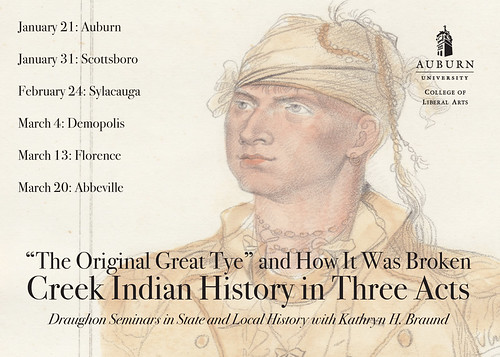History of Creek Indians in Alabama topic of talk at Pebble Hill Jan. 21
Article body
Alabamians rightly take pride in the early history of their state, including the complex history of the Creek people who once claimed this land as their own. In this retrospective, Braund will look at the major eras of Creek Indian history, touching on their link to the British through the deerskin trade, their material culture and economy, and the changing nature of tribal authority as plantation agriculture and herding replaced trade as the "way to wealth" in the Indian nation.
Braund is the Hollifield Professor of Southern History at Auburn University. She is the author of "Deerskins and Duffels: The Creek Indian Trade with Anglo-America, 1685−1815," coeditor of "Fields of Vision: Essays on the Travels of William Bartram" and "William Bartram on the Southeastern Indians" and editor of "Tohopeka: Rethinking the Creek War and the War of 1812."
The talk is a part of the Draughon Seminars in State and Local History, a series of statewide lectures sponsored by the Caroline Marshall Draughon Center for the Arts and Humanities in the College of Liberal Arts at Auburn University. The series is funded by the Kelly Mosley Endowment in honor of Ralph B. Draughon, president of Auburn University from 1947 to 1965. Draughon was a historian with a deep commitment to both state history and public education.
The event is free, open to the public and will be followed by refreshments. The Caroline Marshall Draughon Center for the Arts and Humanities at Pebble Hill is located at 101 S. Debardeleben St. in Auburn. The historic 1847 Scott-Yarbrough house, known as Pebble Hill, will be open for tours from 3 to 4 p.m.
For more information on the program, call (334) 844-4903 or visit www.auburn.edu/cah.
Related Media
Media interested in this story can contact Communications Director Preston Sparks at (334) 844-9999 or preston.sparks@auburn.edu.
Auburn University is a nationally ranked land grant institution recognized for its commitment to world-class scholarship, interdisciplinary research with an elite, top-tier Carnegie R1 classification, life-changing outreach with Carnegie’s Community Engagement designation and an undergraduate education experience second to none. Auburn is home to more than 30,000 students, and its faculty and research partners collaborate to develop and deliver meaningful scholarship, science and technology-based advancements that meet pressing regional, national and global needs. Auburn’s commitment to active student engagement, professional success and public/private partnership drives a growing reputation for outreach and extension that delivers broad economic, health and societal impact.





